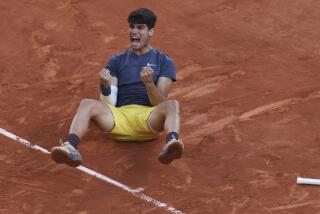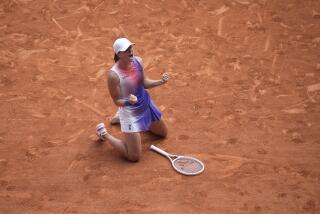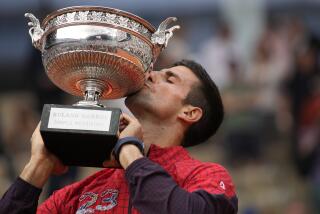Kafelnikov a Jolly Bear at French
- Share via
PARIS — The talent has always been there, for those who had the ability to look past the temperament and bluster of Yevgeny Kafelnikov. Anatoly Lepeshin saw it in a gangly 17-year-old holding a junior ranking of No. 450 and a massive chip on his shoulder.
So when the burly Lepeshin wept after Kafelnikov won the French Open men’s singles title on Sunday, he was crying because the promise he had seen and nurtured had finally blossomed.
Kafelnikov, seeded sixth, defeated 15th-seeded Michael Stich, 7-6 (7-4), 7-5, 7-6 (7-4), using brilliant shotmaking and offering the best look yet at his remarkable skills. The 22-year-old Russian gave no ground at Roland Garros--on his way to the title Kafelnikov lost only one set, and that went to a tiebreak.
Mercurial and unfocused in the past, Kafelnikov seems to have found his range here. After years of being called a head case, a volatile player who would never live up to his enormous potential, Kafelnikov was redeemed by winning his first Grand Slam title in his first Grand Slam final.
Kafelnikov and Lepeshin, who have stood by each other through criticism in Russia and elsewhere, were two happy men after Sunday’s final played on another blazing day.
“I was nobody, nobody wanted to work with me, I was a strange person,” Kafelnikov said of his pairing with his coach, Lepeshin. “He believed in me. He took me and in six years I won a Grand Slam title. We never thought someday it might happen. That’s why he was so emotional on the court.”
Kafelnikov also won the doubles on Saturday, becoming the first man to win both singles and doubles titles at the French Open since Ken Rosewall in 1968.
In a sport now dominated by Americans and western Europeans, Kafelnikov is the first Russian to win a Grand Slam tournament. Only on Sunday did the Russian television network arrange to broadcast the match to fans in a nation where Kafelnikov is seen as a controversial figure because of his refusal to speak to reporters or discuss his personal life.
Tall, blond and stoic on court, Kafelnikov seldom gave in to Stich’s barrage of volleys from his insistent position at the net. In addition to having an array of clever shots available to him from the baseline, Kafelnikov has one of the game’s most potent service returns.
In deference to that weapon, Stich began the match by not following his serve to net, as would be customary. Even when Stich charged the net late in the match it was more habit than tactic: He got in only 48% of his first serves and frequently got caught, trying to awkwardly volley a ball returned to his feet.
Normally highly efficient, Stich was pressured into 56 unforced errors.
“Michael is a very, very aggressive player,” Kafelnikov said. “He was trying to dominate me at the net and he was trying to come to the net faster than he can. I tried to maintain [depth] from the baseline. I think I was a little bit more consistent than Michael.”
Kafelnikov won the first set by outplaying Stich in the tiebreak, but the German rebounded. He held a 5-2 lead in the second set and was twice serving for the set and was broken each time.
“Throughout the whole match I served very badly,” Stich said. “I just couldn’t get any free points on my first serve and I didn’t serve well when I had to most of the time. That’s what it came down to.”
Stich started fast again in the third set, going up a break and leading, 3-1. He was broken in the eighth game when he hesitated while rushing the net and smacked a forehand to the net.
Kafelnikov needed four match points to win the match in the third set tiebreak. It was the first time here that there have been two tiebreaks played in the men’s final.
Stich, who won Wimbledon in 1991, had considered not playing on the clay here since returning to the tour three weeks ago after ankle surgery. He entered, hoping only to gain match fitness and then get ready for the grass-court season.
After beating Thomas Muster, the defending champion, and unexpectedly reaching the final, Stich spoke of learning to enjoy tennis after his long layoff. Stich is the first German to reach the French Open final since 1937.
Stich was gracious in defeat Sunday and spoke to the spectators in French, thanking them for their support and saying, “I may have lost the match, but I regained my love for the sport.”
No doubt, this will be considered Kafelnikov’s breakthrough, although the French Open has been a friendly venue for launching young players. Among others who won at Roland Garros in their first Grand Slam final are Bjorn Borg, Andres Gomez, Jim Courier, Michael Chang, Sergi Bruguera and Thomas Muster.
More to Read
Go beyond the scoreboard
Get the latest on L.A.'s teams in the daily Sports Report newsletter.
You may occasionally receive promotional content from the Los Angeles Times.











